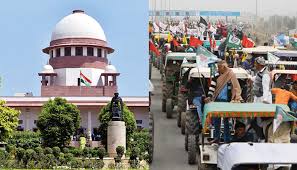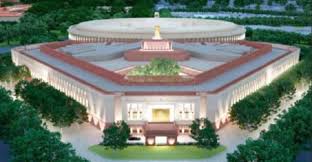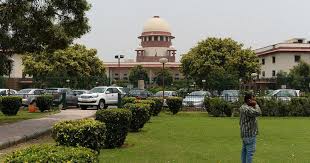Feature
SC to hear plea for relook on gay sex verdict

 New Delhi:The Supreme Court on Tuesday will hold an open court hearing of the curative petition by NGO Naz Foundation seeking relook at its verdict upholding the validity of Indian Penal Code’s section 377 criminalising gay sex.
New Delhi:The Supreme Court on Tuesday will hold an open court hearing of the curative petition by NGO Naz Foundation seeking relook at its verdict upholding the validity of Indian Penal Code’s section 377 criminalising gay sex.
A bench of three seniormost judges – Chief Justice T.S. Thakur, Justice Anil R. Dave and Justice Jagdish Singh Khehar – would hold the open court of the issue that caused flutters both in legal circles and amongst gay rights activitsts after top court by its December 12, 2013 upheld the validity of section 377.
The apex court by its order of December 12, 2013 and subsequently in the review petition on January 28, 2014, upheld the validity of section 377, finding no constitutional infirmity in the penal provision that criminalises homosexuality.
Upholding the validity of section 377, the court had set aside the Delhi High Court verdict of July 2, 2009 by which it had read down section 377 and decriminalising consensual sex between the adults of same gender.
The then bench of Chief Justice P.Sathasivam, Justice R.M.Lodha, Justice H.L.Dattu and Justice S.J.Mukhopadhaya (all retired since then) had on April 3, 2014, directed the hearing of the curative petition in open court after they considered the plea by Naz Foundation in their chambers.
The NGO had moved the Supreme Court seeking to cure “gross miscarriage of justice” in its judgment upholding the validity of section 377. It had contended that 2013 amendment to section 375, which deals with rape, had held consensual sex between an adult male and woman was not an offence.
The curative petition had said that by implication, such sexual acts between man and woman, which are consensual, are no longer prohibited.
Consequently, these consensual acts between man and woman have been taken out of the ambit of section 377, otherwise the amended Section 375 would be rendered redundant, it contended, adding that section 377 now effectively only criminalises all forms of penetrative sex, including, penile-anal sex and penile oral sex, which makes it ex facie discriminatory against homosexual men and transgender persons and thus violative of article 14 of the constitution.
It had said that the amendments to section 375 were carried out after the judgment in the gay sex case was reserved and the parties did not have a chance to address the court on the issue, and the court ought to have heard the parties on the effect of the amendments to section 375 on Section 377.
The curative petition said that court had erred in upholding the classification between carnal intercourse in the ordinary course of nature and carnal intercourse against the order of nature under section 377, without recording a finding on the carnal intercourse against the order of nature. And whether there is a rational nexus with the object of legislation on this count.
The impugned judgment, it said, “reflects an issue bias against the LGBT persons, as evident from such observations like “the so-called rights of LGBT persons” and “miniscule fraction of the country’s population” which vitiates the judgment and renders it a nullity.
Entertainment
Meghalaya Reserves Legalized Gambling and Sports Betting for Tourists

The State Scores Extra High on Gaming-Friendly Industry Index
Meghalaya scored 92.85 out of 100 possible points in a Gaming Industry Index and proved to be India’s most gaming-friendly state following its recent profound legislation changes over the field allowing land-based and online gaming, including games of chance, under a licensing regime.
The index by the UK India Business Council (UKIBC) uses a scale of 0 to 100 to measure the level of legalisation on gambling and betting achieved by a state based on the scores over a set of seven different games – lottery, horse racing, betting on sports, poker, rummy, casino and fantasy sports
Starting from February last year, Meghalaya became the third state in India’s northeast to legalise gambling and betting after Sikkim and Nagaland. After consultations with the UKIBC, the state proceeded with the adoption of the Meghalaya Regulation of Gaming Act, 2021 and the nullification of the Meghalaya Prevention of Gambling Act, 1970. Subsequently in December, the Meghalaya Regulation of Gaming Rules, 2021 were notified and came into force.
All for the Tourists
The move to legalise and license various forms of offline and online betting and gambling in Meghalaya is aimed at boosting tourism and creating jobs, and altogether raising taxation revenues for the northeastern state. At the same time, the opportunities to bet and gamble legally will be reserved only for tourists and visitors.
“We came out with a Gaming Act and subsequently framed the Regulation of Gaming Rules, 2021. The government will accordingly issue licenses to operate games of skill and chance, both online and offline,” said James P. K. Sangma, Meghalaya State Law and Taxation Minister speaking in the capital city of Shillong. “But the legalized gambling and gaming will only be for tourists and not residents of Meghalaya,” he continued.
To be allowed to play, tourists and people visiting the state for work or business purposes will have to prove their non-resident status by presenting appropriate documents, in a process similar to a bank KYC (Know Your Customer) procedure.
Meghalaya Reaches Out to a Vast Market
With 140 millions of people in India estimated to bet regularly on sports, and a total of 370 million desi bettors around prominent sporting events, as per data from one of the latest reports by Esse N Videri, Meghalaya is set to reach out and take a piece of a vast market.
Estimates on the financial value of India’s sports betting market, combined across all types of offline channels and online sports and cricket predictions and betting platforms, speak about amounts between $130 and $150 billion (roughly between ₹9.7 and ₹11.5 lakh crore).
Andhra Pradesh, Telangana and Delhi are shown to deliver the highest number of bettors and Meghalaya can count on substantial tourists flow from their betting circles. The sports betting communities of Karnataka, Maharashtra, Uttar Pradesh and Haryana are also not to be underestimated.
Among the sports, cricket is most popular, registering 68 percent of the total bet count analyzed by Esse N Videri. Football takes second position with 11 percent of the bets, followed by betting on FIFA at 7 percent and on eCricket at 5 percent. The last position in the Top 5 of popular sports for betting in India is taken by tennis with 3 percent of the bet count.
Local Citizens will Still have Their Teer Betting
Meghalaya residents will still be permitted to participate in teer betting over arrow-shooting results. Teer is a traditional method of gambling, somewhat similar to a lottery draw, and held under the rules of the Meghalaya Regulation of the Game of Arrow Shooting and the Sale of Teer Tickets Act, 2018.
Teer includes bettors wagering on the number of arrows that reach the target which is placed about 50 meters away from a team of 20 archers positioned in a semicircle.
The archers shoot volleys of arrows at the target for ten minutes, and players place their bets choosing a number between 0 and 99 trying to guess the last two digits of the number of arrows that successfully pierce the target.
If, for example, the number of hits is 256, anyone who has bet on 56 wins an amount eight times bigger than their wager.





















